Testimony of the Day
“I just had a baby 8 weeks ago and followed Maria’s WOE the whole time. I occasionally went up to 60g carbs a day because I LOVE fruit and like to have it fresh and in season. I had the best, easiest pregnancy I ever had! I had very minimal morning sickness and less fatigue than with the others. I had no swelling and my blood pressure was perfect. I never experienced that extreme discomfort that so many women complain of. I 100% attribute a great pregnancy to Maria’s WOE. I gave birth naturally to a very healthy 7lb 5oz baby boy. I’m actually sad he’s the last one because my pregnancy was so wonderful.” -Sue
Click HERE to get started on your keto-adapted diet.
“Maria helped me lose 75 pounds in just over a year. The Maria way cleared up many health issues I had been struggling with, some my whole life. Losing the weight and getting into the best health of my life also helped me and my husband get pregnant after 7 years of trying and two miscarriages. We are due with our little girl in February. Thank you Maria Emmerich for changing my life.” Leah
BABY ACID REFLUX
Sadly, parents often think that rice cereal is the first food to introduce to a baby. Dr. David Ludwig of Children’s Hospital Boston, a specialist in pediatric nutrition, says some studies suggest rice and other highly processed grain cereals actually could be among the worst foods for infants. Babies don’t even produce the enzyme amylase, which is the essential enzyme for breaking down starch. The baby’s small intestine basically only produces one enzyme for starch, lactase; which is for the digestion of lactose. Feeding grains too early will cause food allergies later on in life because the protein in the grains sit in the stomach too long. This will cause the baby to have acid reflux.
“The number one ingredient in what we call rice ‘cereal’ is processed white rice flour. That’s all the rice there is. There are also some vitamins and minerals sprinkled in that babies could easily get in other ways. These don’t make this gateway junk food healthy … Metabolically, it’s not that different from giving babies a spoonful of sugar.” Stanford-based pediatrician Dr. Alan Greene.
Parents desperately go to the doctor for help; most likely putting the baby on acid blockers. This is the WORST thing to do because the stomach is a very acid environment with a pH at 2 or less. Stomach acid is essential for to absorb vitamin B-12 and minerals that allow you to release hormones from the pancreas, without which can lead to development of diabetes.
Stomach acid also helps breakdown protein. When you don’t have stomach acid to breakdown food, undigested proteins sit like a rock in the intestines. This slowly eats holes in your intestines and this inflammation begins a detrimental snowball effect. When you start to have holes in your intestines, food starts to leak into your bloodstream (leading to leaky gut syndrome). This is awful because the immune system goes into overdrive to kill the unknown substances in the blood…NOW we have food allergies! So if you are feeding the baby grains and cow’s milk, they will most likely develop a wheat and dairy allergy…oh boy!
There has recently been a 16X increase in the use of acid reflux medicine in infants. Even though a study showed that there was no difference in infants from a placebo! When families eliminate common allergen such as dairy, soy and wheat from the baby’s and breastfeeding mother’s diet, by day 3 or 4 the infants no longer suffer from acid reflux. This means a total elimination! Not just the 80/20 rule. It takes a lot of commitment by the family, but it is well worth the effort.
Milk based formulas often cause allergies while soy based formulas contain growth inhibitors, mineral blocking phytic acid, and plant forms of estrogens that has adverse effects on hormonal development. Soy formula is also devoid of cholesterol which is essential for the brain (our brains are 60% cholesterol!) and nervous system.
If you have a baby or YOU are suffering from acid reflux, click HERE for natural supplements to heal and eliminate acid reflux naturally.
Organic Egg yolks, rich in choline, cholesterol and other brain-nourishing substances, can be added to your baby’s diet as early as four months,1 as long as baby takes it easily. (If baby reacts poorly to egg yolk at that age, discontinue and try again one month later.) Cholesterol is vital for the insulation of the nerves in the brain and the entire central nervous system. It helps with fat digestion by increasing the formation of bile acids and is necessary for the production of many hormones. Since the brain is so dependent on cholesterol, it is especially vital during this time when brain growth is in hyper-speed. Choline is another critical nutrient for brain development. The traditional practice of feeding egg yolks early is confirmed by current research. A study published in the June 2002 issue of the American Journal of Clinical Nutrition compared the nutritional effects of feeding weaning infants 6-12 months of age regular egg yolks, enriched egg yolks, and an otherwise normal diet. The researchers found that both breastfed and formula-fed infants who consumed the egg yolks had improved iron levels when compared with the infants who did not. In addition, those infants who got the egg yolks enriched with extra fatty acids had 30 percent to 40 percent greater DHA levels than those fed regular egg yolks. No significant effect on blood cholesterol levels was seen.
The best choice for baby is yolks from pasture-fed hens raised on fish meal, or insects since they will contain higher levels of DHA. Why just the yolk? The white is the portion that most often causes allergic reactions, so wait to give egg whites until after your child turns one. Don’t neglect to put a pinch of salt on the egg yolk. While many books warn against giving salt to babies, salt is actually critical for digestion as well as for brain development. Use unrefined salt to supply a variety of trace minerals.
FUN FACT: The lean human body is 74% fat and 26% protein by calories. Fats are a structural part of every human cell and the preferred fuel source of the mitochondria, the energy-burning units of each cell. A fetus naturally uses ketones before and immediately after birth.
If you are interested, I have an online class called “HEALTHY FAMILY.” To watch this helpful class, click HERE.
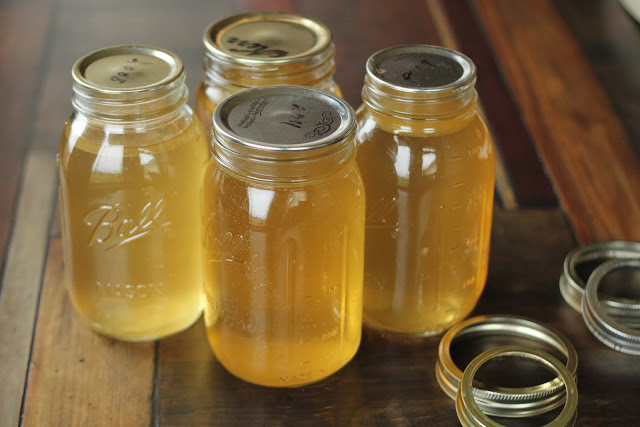
Baby Kai’s “JUICE”
No, this isn’t apple juice… it is bone broth (recipe Here)! I make a pot for him once a week to put into his bottle. When he sees this when he wakes up his legs start to kick a mile a minute! He LOVES this stuff!
Bone broths are …one of the most nourishing foods. It is so medicinal that if I could bottle up into a pill, the pharmaceutical companies would be broke.
Because broth can be regarded as a liquefied form of the important components of bones, the medicinal benefits of bone broth are attributed to the exceptionally high levels of minerals and amino acids. In fact, bone broth can be considered both a high-quality multi-mineral and protein supplement.
1. HYDROPHILIC COLLOIDS: Stock is also awesome because it has hydrophilic colloids. Raw foods are colloidal and are hydrophilic, meaning that they attract liquids. This is important because when we eat a salad or other raw food, the hydrophilic colloids attract digestive juices for rapid and effective digestion. Colloids that have been heated are usually hydrophobic (meaning they repel liquids, making cooked foods harder to digest). However, the gelatin in meat broths has the special property of attracting liquids even after it has been heated. A good visual is Jell-O, the gelatin attracts water to form desserts, which allows it to attract digestive juices to the surface of cooked food particles.
2. CROHN’S and COLITIS: Broth contains gelatin, which aids in digestion and works amazing as a treatment of intestinal disorders, including hyperacidity, colitis, and Crohn’s disease because it heals the intestinal wall. Many clients of mine have Colitis, leaky gut, diverticulitis, Crohn’s or other intestinal problems. By supplementing with broth and other key supplements (such as l-glutamine) we can strengthen the intestinal walls, which also supports our immune system. Babies had fewer digestive problems when gelatin was added to their milk. It enhances digestion by attracting digestive juices to food in the gut. It also calms and soothes the gut lining. Gelatin should be the first therapeutic food for anyone suffering from digestive conditions affecting the intestines.
3. Collagen is a protein extracted in broth through the breakdown of bone and cartilage during the cooking process and is referred to as gelatin. The quality of broth is usually determined by the amount of gelatin it contains. The gelatin in broth is also useful for the treatment of anemia and other blood disorders, like diabetes, muscular dystrophy and even cancer.
4. AMINO ACIDS: Although gelatin isn’t a complete protein, (it only has the amino acids arginine and glycine in large amounts) it acts as a protein sparer, allowing the body to more fully utilize the complete proteins that are taken in. So if you are someone who can’t afford large amounts of meat in your diet, gelatin-rich broths are great to help boost protein absorption.
5. MINERAL ABSORPTION: Healthy bone tissue is naturally high in minerals (calcium, magnesium, phosphorus, potassium) which provide a healthy bone structure, nervous system as well as hormone balance. Fish stock will also provide iodine which is essential for a healthy thyroid. Broths made from fish bones will also provide iodine. The gelatin in broth strengthens digestion which helps you absorb more nutrients. Gelatin helps people digest milk and dairy products.
“Stock contains minerals in a form the body can absorb easily—not just calcium but also magnesium, phosphorus, silicon, sulfur and trace minerals. It contains the broken down material from cartilage and tendons–stuff like chondroitin sulfates and glucosamine, now sold as expensive supplements for arthritis and joint pain.” Sally Fallon Morell
6. JOINT HEALTH: Since the gelatin is derived from cartilage a huge benefit of broth is that it provides an awesome source of glucosamine and chondroitin. These nutrients are essential for regaining joint health.
NOTE: When making bone broth using an acid like organic vinegar helps extract more minerals from the bones. The extracted minerals then become the alkalinizing agents to neutralize the acidity of the broth. I use coconut vinegar. Coconut vinegar exceeds all other vinegar in amino acids, vitamins, and mineral content. It is also a FOS (prebiotic that promotes digestive health). Don’t worry, it doesn’t taste like coconut! Click HERE to find.
I am more like you than you realize… you can find me opening a Kettle and Fire organic beef broth instead of making my own broth quite often.


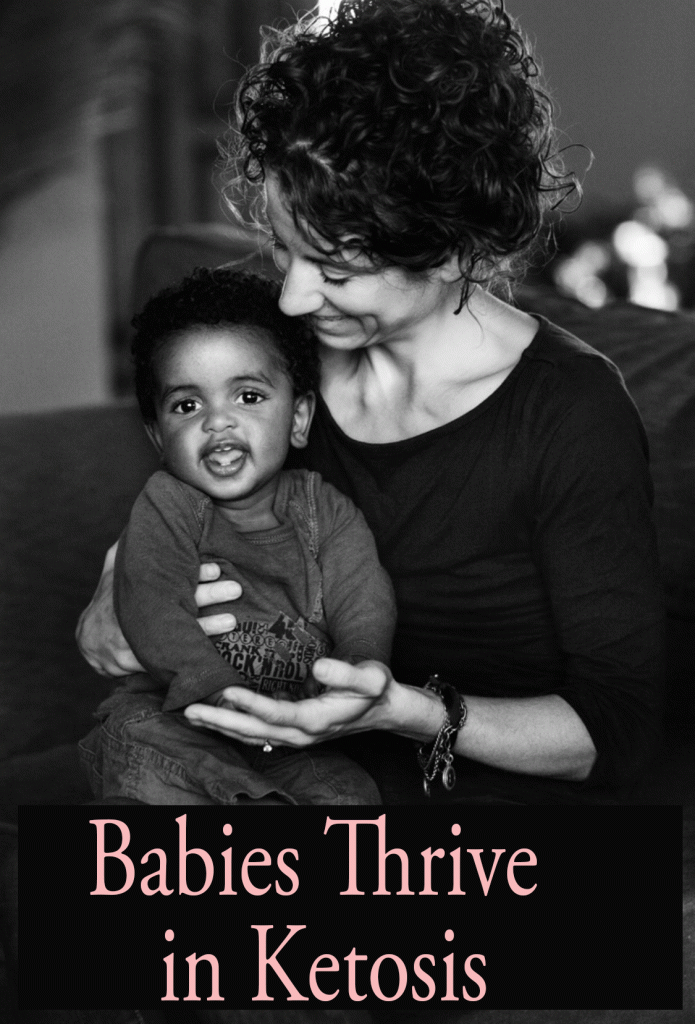

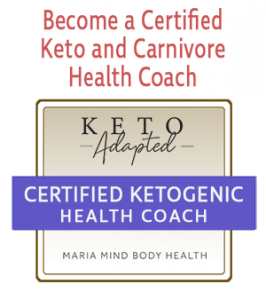

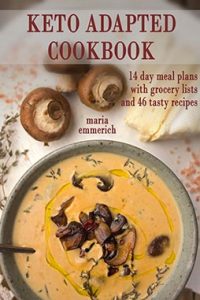

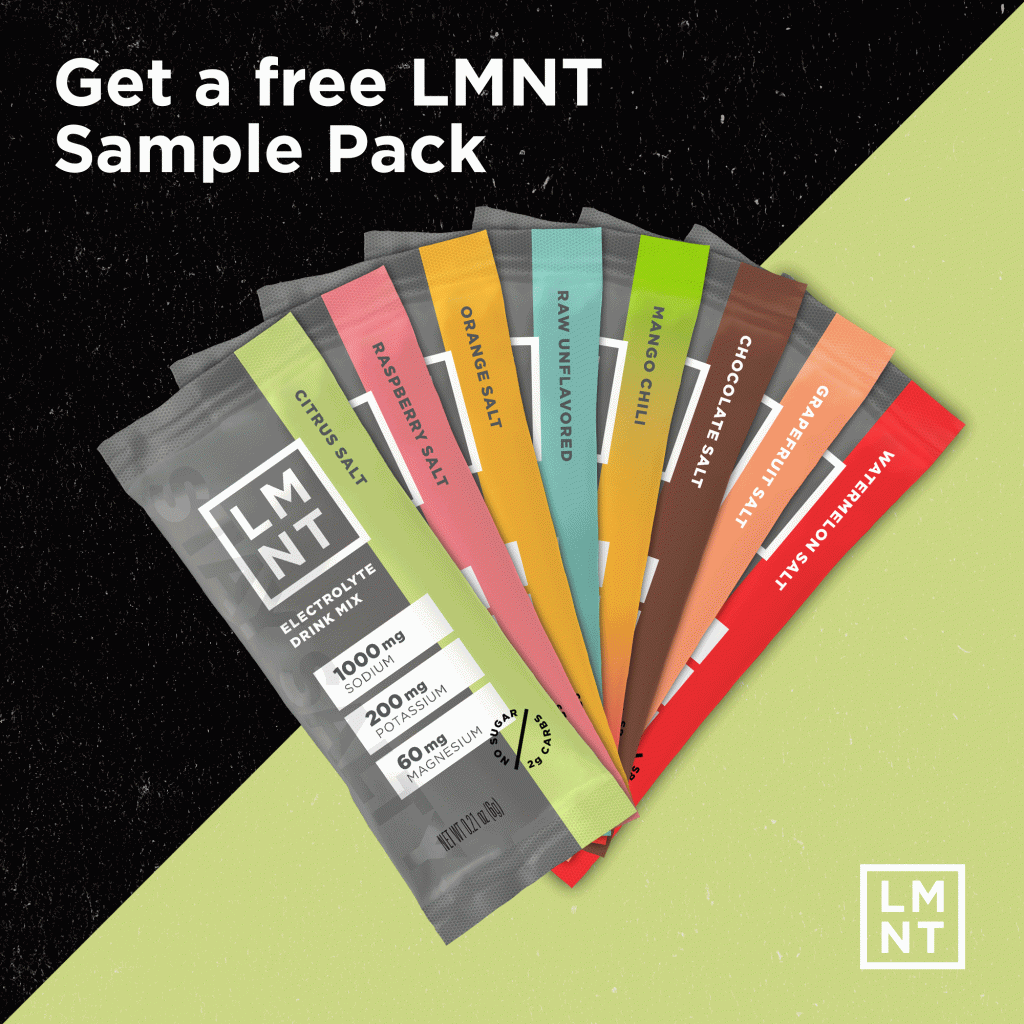
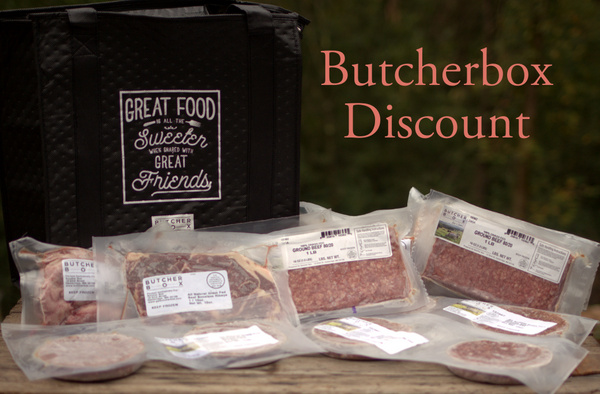


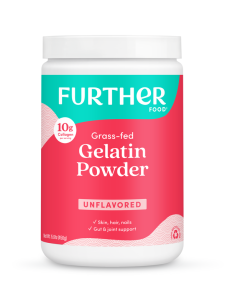
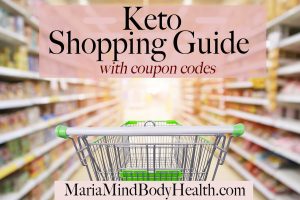


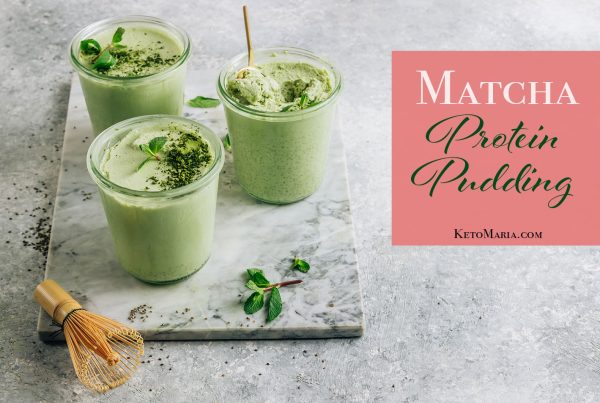
Amazing!!! Thank you for posting…when I told my pediatrician my baby’s first food was avocado she told me that was weird!! :O
Also, where can I get the cod liver oil for my baby? Since she’s breastfed with a few solids added into her diet I want to make sure she’s getting enough Vitamin D. Thanks! 🙂
Thanks Tina!
I had a client tell me yesterday when she asked her doctor on what to do about her brittle finger nails, he said to put fingernail polish on them!
Way to be a good parent and educate yourself!
Tina, I recommend all of these for children: http://astore.amazon.com/marisnutran05-20?_encoding=UTF8&node=17
Hi Maria! I love your posts and info do much! Thank you for all your work! When and what should we add after the egg yokes and avocado? I want to do it right this time! 🙂
I have a wonderful online class called “Healthy Family” that you would LOVE.
How do you make bone broth?
Here you go. 🙂 http://mariahealth.blogspot.com/2011/10/chicken-dumpling-soup-and-intestinal.html
At what age do you recommend giving babies bone broth?
It is good for transitioning off of breast milk or supplementing it. We started Kai on it as soon as he came home (13 months old). 🙂
How much bone broth per day do you recommend for infants 6-12 months of age if supplementing with breast feeding?
I would follow a normal bottle feeding quidelines along with his solid foods (in my kids book I talk about babies first foods like egg yolks, avocado, etc). 🙂
I have tried every kind of milk with my baby from raw cow to goat to coconut and she’s just not interested in anything but breast milk from the breast. That’s fine when I’m home but when she’s hanging out with dad for the day it get’s to be problematic. I have a freezer full of stock that I love to use for cooking and I just put a chicken broth container in the fridge. I’ve got my fingers crossed she’ll like broth!
The bone broth would be a good option. If that doesn’t work you could try one of the formula recipes here;
http://www.westonaprice.org/childrens-health/recipes-for-homemade-baby-formula
How young can you give bone broth to supplement breast milk? My baby is 6 weeks old and I had to start supplementing with formula because she wasn’t gaining weight because I wasn’t producing enough for her. I really hate giving her formula…is there anything else I can supplement with or what can I do to increase my milk supply. I want to start eating the Maria way but can I do everything without altering if I am still breastfeeding?
Thanks!
There isn’t any reason this can’t be supplementing her dietary needs. Always check with a doctor before making any dietary changes at this age. 🙂
Do you recommended a liquid multivitamin? I didnt see one in your amazon store. Thanks
There is one right here. 🙂
http://astore.amazon.com/marisnutran05-20/detail/B000G26U7Y
Hi Maria,
thank you for all your info!!
My grandfather was deathly allergic to eggs and my father is allergic as well… should I stay away from egg yolks as a 1st food? maybe just do avocado?
Thank you so much!!!!
Well, I think eggs yolks are one of the most perfect foods so I wouldn’t want to remove them if you don’t have to. Maybe try a very small amount and see how she reacts and work up from there. 🙂
Maria,
My baby loves avocado but every single time I’ve fed it to her, she gets extremely constipated! Is this typical for avocados?? Any ideas on how to prevent this? Should I feed her pureed prunes along side of it or something? I’ve resorted to purchasing organic cold pressed avocado oil that I sometimes will drizzle over her other non-sweet foods so she still gets the benefits of the avocado but without getting constipated.
Yes, avocado oil is a good option. Maybe make sure she gets extra water when you try an avocado. 😉
I’m not sure what to do here. My infant is below the tenth percentile for weight and has been ever since her first checkup. She is 9 months old and hasn’t gained any weight in a month but hasn’t lost any either. I don’t feed her any grains and only give her organic fruits, vegetables, yogurt, meats. What are the best foods I can feed her to help her gain weight? Everyone tells me to give her rice to help gain but I don’t want to do that. I also give her oils/butter oil every day (cod liver oil, avocado oil, coconut oil). She still gets formula since she is only 9 months but I am at a loss as to what is good to give her for this purpose? She is overall very happy and healthy and active other than she gets sinus infections pretty often. I don’t want her doctor thinking I’m not feeding her enough 🙁 She eats/drinks until she is full and I don’t force anything.
I would try adding some bone broth. That is a very healthy drink (that also has some good fat in it). Also, make sure to give her a fat bomb or another high fat snack right before bed. 🙂
Also, 10% isn’t necessarily a real big deal at that age in my opinion. If every kid was 50%, there would be no 90% or 10%. Our boys were barely on the charts when we brought them home (less than 5%). Partially from the nutrition in Ethiopia. But once home (after about a year) they slowly crept up and are close to 50% now. 🙂
Thank you so much. How much bone broth should I give her per day? Should I add it in addition to her bottles or in place of a bottle? Also, I haven’t seen any organic free range whole chickens in the stores where I live. Is giving a conventional chicken bad? I just see the ones with no hormones or antibiotics and that’s about it! Any good fat bomb recipe recommendations?
Can infants have unsweetened cocoa powder? I want to make your chocolate avocado pudding but I didnt know if the chocolate was bad for babies.
I haven’t heard of any issues with cocoa and infants. 😉
Hi Maria, as a family we have been trying to follow the Maria way for a few months now. We were able to purchase one of the packs and have all the books and have seen the healthy family presentation. I have been doing the low carb diet now and been breastfeeding my almost 8 month old daughter (and changing our three boys diets too!!) Our daughter is underweight and we are concerned she is not getting enough. I gave her egg yolks but she throws up an hour after eating them (waited five weeks and tried again and same thing happened). I saw on the other posts to try bone broth, which I will do right away. She doesn’t take to the bottle well, so is it ok to add it into her food? She loves avocados and all the veggies I have given her. I haven’t given her much fruit yet apart from a small serving of banana to thicken up homemade veggies. On one of the slides from the healthy family, I saw a picture of a baby food that was a roast beef dinner. Is that something I can add into her diet now and if so, is their a brand you recommend? I have been making her food, so can I start taking some of the meats we make and puree them (like salmon or chicken?) Thanks for your time and help! Thanks for all the ways you have helped our family!
Yes, adding bone broth to food is great! Also, anything healthy you eat can be ground up and given to her. It is a great way to open her pallet to new things and healthy options. 🙂
Hi Maria – about how much bone broth per day do you recommend for a 6 month old breastfed baby who just started on solids? And in young babies like mine, I’ve heard of spoon feeding bone broth or feeding with a syringe, but is there any reason to not put it in a bottle if baby is already accustomed to them? Based on previous experiences with syringes and liquids on a spoon, I am skeptical that much of it would actually be consumed ; ). I noticed you said you fed your child bone broth in a bottle, but I think that was from 13 months on?
We gave Kai a bottle of bone broth (warmed up a little). It was his food except for some solids we started (egg yolk, avocado). 🙂
Hey Maria!
If a person is not able to nurse an infant, is there a formula you recommend or a recipe for one that you agree with?
thank you so much!
Here you go: http://www.westonaprice.org/beginner-videos/baby-formula-video-by-sarah-pope-2/
Hey Maria! Wondering your thought about feeding baby bananas & sweet potatoes? ?? I don’t want to start her on anything sweet but so many people & website recommend them. Thoughts??
I wouldn’t. Sugar is sugar. It will increase sweet tooth.
Hey Maria. My breastfed baby is ready to start eating solid foods. Our pediatrician recommends iron fortified cereal twice a day. I was going to feed egg yolk and maybe some raw liver instead, but the recommended amount of iron is 11 mg/day and from what information I can find, egg yolks only have about 0.5 mg/yolk. Does the bone broth have iron? What are your opinions about this? Thanks!
My boys loved puréed liver!!!!
Hi Maria. At what age is it ok for babies to have rice. We follow a healthy organic diet and occasionally eat rice pasta due to gluten allergies , and some rice with Mexican dishes. She is 14 months old, still breast fed. We did start her on avocados and the egg yolks but recently have given her some of the above named foods. And after rereading your article we are concerned.
I don’t recommend rice at all. Sorry.
i have a 3 week old and she is very gassy and shows a lot of discomfort passing gas. I try to eat a low carb high fat lifestyle. I was wondering if it could be something I’m eating? Someone told me it could possibly be my milk letting go fast when she first starts feeding. I was wondering what your input on this would be?
I wish I had this info when my daughter was born. It would have saved us a lot of grief ( I believe) . Oh well, I’m here now! 🙂